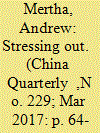| Srl | Item |
| 1 |
ID:
189027


|
|
|
|
|
| Summary/Abstract |
Rectification as the return of sites of violence to prior use is little studied even as governments often defiantly reconstruct such sites and urge citizens to visit them as a way to combat ‘terror’. Using the case study of the 2013 Westgate shopping mall attack in Kenya and the subsequent return of the site to prior use, the article reflects on the broader practices of erasure of violence from public space as a unique form of a memory–security nexus. The article reads amnesia and its effects through material and social practices of rectification – renovation, fortification, closure and reopening, and the experiences of survivors and non-survivors in reinhabiting these spaces. The ways in which violence is vacated from space and speech, and the ways in which its absence is encountered by diverse people, produce a rich transcript on memory and its entanglements with security agendas. They also reveal the deleterious effects of politicized ‘triumphalist amnesia’ enlisted as a counter-terror tool, including the emotional tax and public distrust arising from non-recognition when memory is equated with vulnerability and forgetting with defiance. Triumphalist amnesia might produce the opposite effect – a failure to root out violence and insecurity among those asked to confront it.
|
|
|
|
|
|
|
|
|
|
|
|
|
|
|
|
| 2 |
ID:
151577


|
|
|
|
|
| Summary/Abstract |
Might authoritarian one-party systems experience something akin to party identification – or affective proximity to the Party – that waxes and wanes over time? Such cycles do not centre on elections but on the politics of succession, new policy initiatives and ad hoc housecleaning, and their focus would be officials within the system as opposed to the electorate outside it. I argue that a key mechanism animating such variation in party identification of Chinese Communist Party (CCP) cadres lies within the recurring rectification efforts seeking to temper these individuals and make them more submissive to the larger political goals of the Party centre. Such priming is largely an in-house phenomenon, taking place increasingly deeper within the CCP apparatus. This process tends to involve an extensive arsenal of institutional mechanisms that constitute a particularly big stick and within which pressures to comply can be uncomfortable, even excruciating. Normative elements of these movements, such as the language and substantive written materials used during study, analysis and self-criticism are predominantly in the service of enhancing the sheer domineering quality of the Party vis-à-vis the individuals that make up its ranks. I explore this through an examination of the three stresses (san jiang) campaign of 1998–2002.
|
|
|
|
|
|
|
|
|
|
|
|
|
|
|
|